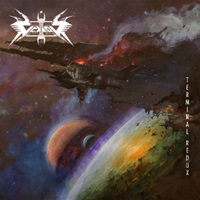Pennsylvania’s progressive sci-fi thrash transplants Vektor are an entity unto themselves in a scene not exactly known for uniqueness. It’s one thing to possess off the chart technical and compositional abilities – and quite another to construct seemingly discordant nuances and strain them into highly intellectual, forward thinking material that people need repeated engagement for absorption and permanent attachment. To say album three Terminal Redux has been long-awaited by the legions of Vektor followers is an understatement – five years beyond Outer Isolation, patience has its rewards for another twisted 10 track, 73-minute odyssey into the depths of Voivod-like twisted chord progressions, ripping lead work, pummeling and frantic bass/drum propulsion and over the top Sacrifice-ish sandpaper high screams that crushes.
Guitarists Erik Nelson and David DiSanto throw down every trick in the axe arsenal from triplets to classic, melodic hook nuances, speedy picking to insane chord changes that places “LCD (Liquid Crystal Disease)” and “Pillars of Sand” into almost progressive blackened thrash territory – and leaves conventional players in the dust. Bassist Frank Chin doesn’t relegate himself to mere bottom end root note activities – often supplementing the aural vision with his own hyperkinetic finger flow, surely taking Geddy Lee/Steve Harris inspiration to transpose for Vektor’s heavier style. Drummer Blake Anderson tackles the maze of tempo changes while still maintaining a semblance of cohesion and groove in stride – 20 seconds into the 9:11 juggernaut that is “Charging the Void”, you’ll hear some insane blast beats against off-time snare/ cymbal work – occasionally incorporating Latin swing or jazz into the thrash realm.
David’s raspy, raw and frantic word spew (part Rob Urbinati, part Chuck Schuldiner) gives “Ultimate Artificer” and the relatively controlled highlight “Psychotropia” that extra slice of evil necessary to keep Vektor from attaining wide ‘commercial’ acceptance. Towards the end of the record, “Collapse” serves up the calmest Vektor arrangement to date – clean melodies and equally clean twin guitar passages during the first half serve as counterpoint charms, something you could expect from older Testament meets Coroner before going heavier in an Iron Maiden/Metallica twin buildup, offering proof that the band understand that longer records need dynamic breathing for the next progressive assault to attain deeper meaning. Sprinkle in the lyrics to make you brood, process, and discuss a future world that could happen in the blink of an eye- given the advances in science and technology – and the galactic cover ties the record up for a total outer realm masterpiece.
The future is in Vektor’s hands. Join in the journey, it’s well worth the investment.


